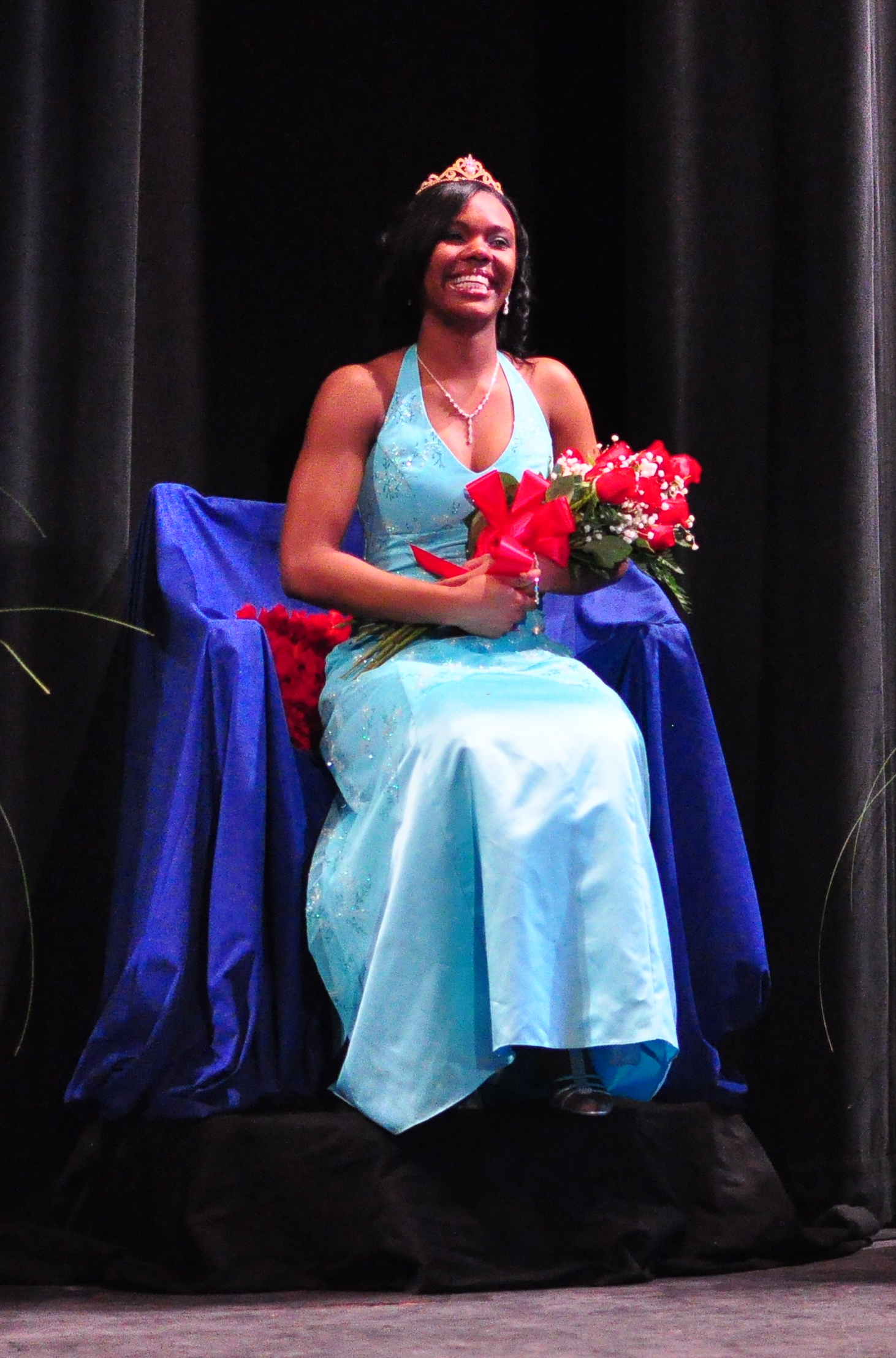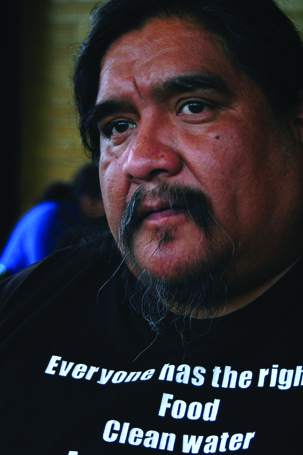
By Julia Comnes
Photos by Jonathan Schell
It didn’t surprise too many people when Nyausha West was crowned the 2012 Grant High School Rose Festival Princess. After all, she’s a captain of the girls basketball team, an active member of her church and a member of the school’s honor roll.
But it hasn’t always been that way for the young woman who Grant staff describe as determined, hard-working and a great leader. There was a time when she struggled in school, got into fights repeatedly and was on the bad side of all of her teachers.
By all accounts, West was a mess. Her father died in 2005 of a rare liver disease, and the loss made West angry with the world. By seventh grade, she had gotten so many suspensions and referrals that she was on the verge of expulsion.
“I would wake up mad and go to sleep mad,” she recalls. “Fighting, cussing, yelling, doing everything a teenager shouldn’t do. That was me.”
Experts say West isn’t alone. When a tragedy strikes, children often have difficulty channeling their feelings. They detach and cope by not following directions, skipping schoolwork and letting out their anger in unhealthy ways.
Grant counselor Liz Mahlum says: “Whenever a young person experiences loss, they deal with it in different ways.”
For West, the experience did not match her early childhood. By all accounts, she was not going to fail.
West was born on Aug. 3 1994, to Travis and Angelia West. Her parents divorced when she was a baby and she lived with her mom.
But West still excelled. She strived to be a “daddy’s girl.” Her father, a wrestler who competed in the 1992 Olympics, encouraged his confident daughter to give sports a try. When she was in second grade, she started playing basketball with two of her sisters.
“He took me to practices, sat in on my practices, took me home, bought me my basketball shoes, got us a basketball hoop so we could play outside my house,” West says of her father. “He was my biggest encourager.”
In third grade, West gave up basketball for track because her father was an assistant coach for the Inner City Steppers Track and Field Team and her brothers were members.
Even though her dad was a coach, he wasn’t afraid to challenge her. At one meet, he signed her up for the 400-meter dash even though West had only run the 100 and the 200 before.
“I started out with all my power, and whoosh, I was going,” she says. “But then I just slowed down because I got tired.”
The other people in the race had crossed the finish line before West made it halfway around the track. She called out to her father, who was walking around the track as she ran, asking him if she could walk off. But he wouldn’t let her. He told her to push through it. “I came in dead last,” says West. “But I didn’t give up.”

She’ll never forget the lesson her father taught her that day: to finish what she started and never to give up.
When she was in fifth grade, West was in the middle of a spelling test one day when she was called to the office. Her stepfather was there and told her that her dad was in the hospital. They drove to see him and were told that he’d be fine; it was just a bad fever.
Nyausha West didn’t know that her father had a history of health problems. When he was 20 years old he slipped into a coma and the doctors told his mother that if he woke up he would be in a vegetative state. But he awoke five days later, his health slowly improved and five years later he wrestled in the Olympics.
Unfortunately, Travis West wasn’t as lucky this time. He had developed a rare liver disease called Primary Sclerosing Cholangitis. West’s family was informed that he needed a transplant.
The night before her father’s surgery, West had a dream that her father had completely healed, that they walked out of the hospital holding hands and drove home together.
But Travis West’s body didn’t accept the liver. They gave him another transplant. The second liver didn’t take and West was taken off life support.
Nothing could compare to the disappointment of the next day. Nyausha West walked into the hospital expecting everything to be normal. But the hospital personnel told her that she wasn’t allowed to see her father. One of her uncles approached her and told her that her father had died.
West and her family talked and cried together at the hospital.
But West was more angry than sad. When her family finally left, they stopped at Burger King, but West was too angry to eat. She was convinced that her father’s death happened because someone at the hospital made a mistake. To her, it was like the doctors killed her dad.
When West came back to school, the year was almost over. But all of her classmates knew about her father’s death. Every day, her classmates would give her their condolences, but West didn’t like people feeling sorry for her.
When West began sixth grade, she was happy that the attention about her loss had subsided. She didn’t tell people about her father unless they asked, and almost no one mentioned it.
But West couldn’t get the anger out of her system. On her first day of middle school at Fernwood, she was told by her science teacher to change seats because she was sitting by a friend. West refused, so the teacher sent her out of the classroom.
From there, things spiraled. She started getting in trouble weekly for not listening to teachers and talking back.
Once, West put a photo of her dad on her MySpace with the caption “R.I.P. Dad.” A girl commented, “Ha, that’s what you get.” West was so mad that she threatened to knock the girl’s teeth out.
Her seventh-grade teacher intervened and asked West what was going on. When West explained that her father had died a couple years before, the teacher gave her a journal and told her to write about it. It was the only time she had told a teacher about her father.
“I still have that journal to this day,” says West.
Later that year, a girl texted something mean to West, and she texted something back in response. The other girl told
on West, and the incident, combined with West’s history of fighting, suspensions and referrals, meant that West had to go through an expulsion hearing.
She was allowed to stay in school but she wasn’t moved to change. She didn’t want to be expelled and go to an alternative school with kids worse off than her, but she was still angry.
The next year, she found a new target in Kiara Redeau. “We just didn’t like each other,” Redeau, a Grant senior says now. “We would just look at each other and want to fight.”
West and her friends spread rumors about Redeau, leaving Redeau with almost no friends.
“It was a mutual dislike,” says Redeau. “But she had more people on her team.”
Things came to a head when the two agreed to fight on the corner outside of their school. Although faculty intervened before the fight could begin, their mutual dislike had grown.
By the end of eighth grade, a few high school students visited West’s class and told the middle school students about how going to high school allowed them to change who they were.
It hit West that she didn’t like the person she had become. She knew that her father wouldn’t be proud of her. She wanted to stop fighting and to get better grades. She didn’t want to be seen as a “bad girl” in high school.
She hasn’t had a single disciplinary action since she entered high school. She evolved from the angry girl to someone happy with her life.
In her freshman year, she joined the basketball team. Redeau, her arch enemy, was also on the team. One day during practice, West started to bully Redeau and it came to the coaches’ attention. The coaches, Redeau and West had a meeting and talked about their past issues. “We had to put our differences aside and play together,” says West.
The enemies quickly became friends, and by their junior year they were best friends.
“We laugh about it every day, like, ‘Girl, remember when I was about to beat you up?’” says West.
During West’s senior year, her mother and her uncle pushed her to try out for the Rose Festival court. West didn’t want to do it at first, but she entered the competition. When West made the first cut, she started to take the festival seriously.
At the Rose Festival announcement ceremony, West was escorted by her grandfather Eursie West, who has served as a fatherly figure since her father’s death. When her name was announced as the winner, West began to cry.
“It was such a relief,” says West. “It felt so good.”
For the past few weeks, West has been attending luncheons, meetings and dress fittings with her 14 other fellow princesses. On May 8, she will no longer be going to school and will travel across Oregon with the other members of the court. The Rose Festival Queen Coronation is on June 9.
Next year, West is going to Grambling State University in Louisiana, where she will study business or sociology. Redeau is going too, and they are hoping to room together.
Whether she wins the title of Queen or not, West wants to use her past experiences to show others they can make it. “I want to be an inspiration for girls who started out like me and are still going like me instead of changing,” West says.




